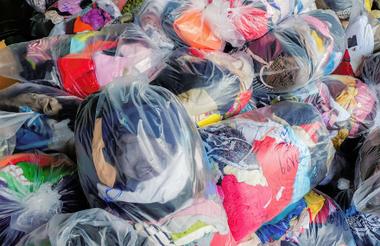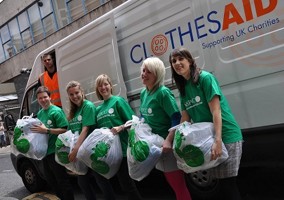Charity bag collection company Clothes Aid has written to both the Fundraising Regulator and the Department for Digital, Culture, Media and Sport to say that unlicensed collections are just as bad, if not worse, than they were a year ago.
Clothes Aid first made an official complaint about unlicensed charity bag collections to the Fundraising Regulator in January 2017. In its letter to Michael Grade, chair of the Fundraising Regulator, Clothes Aid said that as much as “two-thirds of charity collections” observed by its staff were “unlicensed” and said it cost the company’s 12 charity partners more than £1m a year in lost revenue.
Speaking to Civil Society News, Michael Lomotey, director of Clothes Aid, said he has recently written again to both the minister for civil society Tracey Crouch MP and to the Fundraising Regulator, to say that the “situation is still the same, if not worse”.
He said DCMS got the letter "five or six weeks ago", while the Fundraising Regulator was contacted "in the last week or so".
Nine incidents of 'theft or assault' since beginning of year
Lomotey said that Clothes Aid employees have already witnessed 17 unlicensed collections; a further nine “possible unlicensed collections awaiting response from council” and nine incidences of “thefts of our donations by bogus collectors/assault of our personnel” since the beginning of the year.
In its 2017 letter to the regulator, Clothes Aid highlighted 220 separate incidences of unlicensed collections, thefts and assaults between 2013 and 2016.
Lomotey said these incidents had only been "suffered by Clothes Aid" and said "therefore the problem is likely to be much more widespread" across the country.
Clothes Aid's letter to Crouch concerns “licensing regulations and how it works in different parts of the country” and highlights “our concerns about how licensing is joined up around the country" said Lomotey. The letter to the Fundraising Regulator instead asks “what they can do to help with" unlicensed collections, and urges the regulator to hold a joint summit with other sector stakeholders.
'We're seeing things at the edges start to fray'
Lomotey said that a criminal element is beginning to creep back into the charity bag collection sector and said things will only get worse if regulators and the government continue to do nothing.
“We’ve got some of our own concerns about how licensing is joined up around the country. We get really conflicting policies on licensing. Things that we don’t think make it easy for us to run a business, or for charities to fundraise,” said Lomotey.
“With the regulator, they say there are no resources to combat this, so what else can they do? This is what we’ve been saying, there must be something they can do. Having no resources is not an excuse. They have to do something else, because criminality is being allowed to continue and we’re seeing things at the edges start to fray.”
Lomotey also said that the Fundraising Regulator should be doing more to help “smaller charities with their due diligence” when it comes to working with charity bag collection companies.
A spokesperson for the DCMS told Civil Society News that it had “received the letter and will respond in due course”.
Regulator: Unlicensed collections 'hurts charities as well as donors'
A spokesman for the Fundraising Regulator said: "We are aware of complaints about the exploitation of bag collections by criminals. This hurts charities as well as donors.
"Where there are any concerns about fraudulent or criminal activity, we stress that they must be raised with the police and, where appropriate, the local authority. There is an important reason for this: it is a matter of criminal law and must be treated as such.
"The Fundraising Regulator will of course provide assistance where it is invited to do so but has no legal ability to prosecute.
"We advised Clothes Aid of this in May 2017 and received no further communication from them on this issue until 10 April."
Editor's note: This article has been amneded to include a response from the Fundraising Regulator which was given after the article had originally been published.
|
Related Articles












